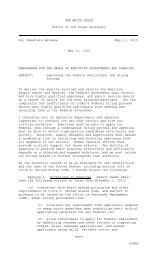Report - Government Executive
Report - Government Executive
Report - Government Executive
You also want an ePaper? Increase the reach of your titles
YUMPU automatically turns print PDFs into web optimized ePapers that Google loves.
CONCLUSIONS<br />
The Panel finds that a significant amount of time and effort have been expended by OUSD(I) and<br />
the DoD intelligence components on DCIPS implementation, but that all aspects of DCIPS<br />
implementation related to the Preparedness component of the OPM Assessment Framework are<br />
nonetheless significantly flawed and that it is too early to assess the Progress component. It is<br />
important to note that this situation is not the sole responsibility of the HR professionals in the<br />
DoD intelligence components tasked with implementing DCIPS. These individuals were given a<br />
charge that would have been very difficult to achieve under the best of circumstances and have<br />
endeavored to do the best job possible.<br />
The Panel further concludes that DCIPS implementation was rushed, and an overall change<br />
management strategy was not established to guide the transformational and tactical dimensions<br />
of implementation. These critical omissions have created a host of challenges that must be<br />
addressed, including a major effort to rebuild employee trust. Given the nature and scope of the<br />
challenges, DCIPS leadership must fill many key gaps in leadership and strategy prior to<br />
engaging in further implementation activities. To prepare a stronger foundation going forward,<br />
leadership must fully support and appropriately allocate additional time and resources to<br />
developing:<br />
• A more thorough strategy;<br />
• A stronger system of governance and accountability;<br />
• Clearer messaging; and<br />
• Refined business rules, tools, and training that support the system.<br />
As noted in the training discussion, a critical missing component is intensive training for firstline<br />
supervisors on all system aspects, including basic managerial behaviors and communications<br />
that underpin DCIPS and every performance management system. The lack of adequate<br />
managerial training is a chronic weakness across the federal government, but it is magnified with<br />
DCIPS since it requires new and different behaviors from supervisors, many of whom have had<br />
limited demands placed on them for developing personnel management skills.<br />
Implementation of a performance management and performance-based compensation system<br />
requires years to accomplish. 162 A more thoughtful, incremental, and methodical approach to<br />
DCIPS implementation will minimize the risk of repeating past implementation mistakes. The<br />
Panel provides the following recommendations to assist OUSD(I) and the DoD intelligence<br />
components to accomplish this successfully with DCIPS.<br />
Recommendation 10. OUSD(I) should develop a comprehensive change management plan<br />
for proceeding with DCIPS implementation that takes the current climate into account,<br />
162 Interviews and the examples of NGA and MITRE support this statement.<br />
91













